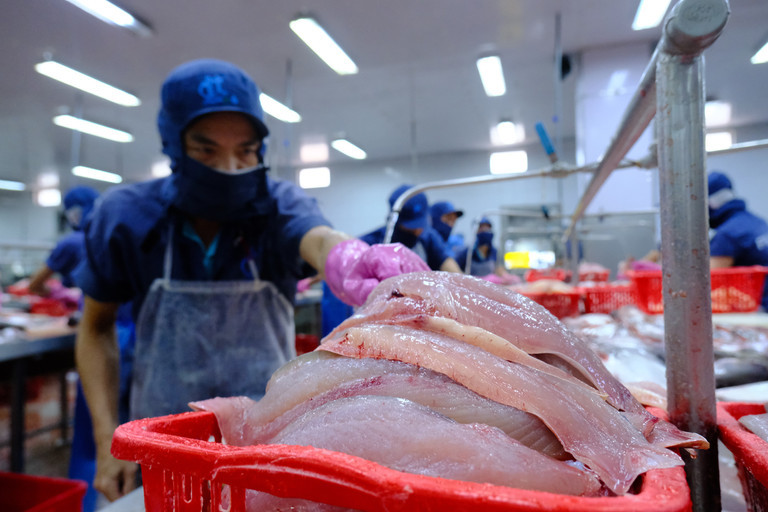
A senior executive of Vinh Hoan Seafood confirmed that there have been optimistic signs in the global catfish market, but admitted that the company is facing difficulties in large markets.
The number of orders has decreased by 30 percent on average for all markets, while the selling prices have dropped dramatically. Meanwhile, production and quality assurance costs, and inventory level all have increased, thus putting pressure on seafood processors.
In the largest catfish farming areas in Mekong Delta, farmers don’t have money to buy feed and face high production costs and low selling prices.
Nguyen Ngoc Hai, chair of Thoi An Catfish Cooperative, said farmers now have to sell catfish at below production costs, and if the situation cannot improve, they won’t be able to continue farming.
The current catfish production cost is hovering around VND28,000-28,500 per kilogram. Meanwhile, a report of the Ministry of Agriculture and Rural Development (MARD) said the catfish prices in Mekong Delta dropped further to VND26,000 per kilogram in November. With the selling price, farmers are incurring a loss of VND2,000 for every kilogram sold.
Nguyen Van Tuan, a farmer in An Giang, estimated that he incurs a loss of VND1-1.5 billion for every pond of fish.
According to MARD, the amount of catfish at ponds is not high, but seafood processing companies have lowered the prices of catfish they buy from farmers because of the sharp fall in exports to key markets.
The General Department of Customs (GDC) reported that catfish exports had brought turnover of $1.7 billion as of the end of November, down 27 percent compared with the same period last year.
The sharp falls have been reported for all key markets, including China (- 22 percent), the US (- 55 percent), EU (- 17 percent) and CPTPP (Comprehensive and Progressive Agreement for Trans-Pacific Partnership) market (- 27 percent).
The lower catfish export prices have led to export turnover decreases. In October, catfish was exported to the US market at $2.9 per kilogram on average, down 37 percent compared with October 2022, while the figures were $2.1 per kilogram and 13 percent, respectively, for the Chinese market.
Low export prices, moderate number orders, and a high inventory level all have affected export companies.
According to Tran Van Hung, CEO of Hung Ca, some exporters are trying to attract more importers by lowering selling prices, but they have increased the additives, leading to lower quality. This has affected Vietnam’s catfish fame in the world market.
MARD reported that the total catfish farming area of Vietnam in 2023 is 5,700 hectares and total output is 1.6 million tons, up 19 percent over 2022. The export turnover is estimated to reach $1.8 billion, a sharp fall compared with the $2.4 billion in 2022.
Catfish is one of Vietnam’s key agricultural export products. With great advantages in the natural conditions of the Mekong Delta, Vietnam has been dominating the catfish global market over the last 26 years with presence in 140 markets.
Vietnam’s catfish exports had modest turnover of $1.65 million in 1997, but the figure soared continuously, turning catfish into ‘multi-billion dollar fish’.
Nevertheless, experts have warned that Vietnam’s catfish market share is shrinking. A report released at the global seafood conference showed that Vietnam’s catfish output had accounted for 99 percent of the total output of the world until 2015, but the figure dropped to 52 percent in 2023.
Many countries have begun farming catfish in recent years and become strong rivals. Indonesia, for example, can produce 0.6 million tons a year, while India reported output of 668,000 tons in 2023, China 400,000 and Bangladesh 500,000 tons. These countries all plan to raise the catfish output in the next years.
Analysts have warned that the competition in the global catfish market will be stiffer in the time to come because of the appearance of many rivals. Meanwhile, Vietnam’s catfish products are mostly fillets and cuts, and added-value products just account for a small proportion. Therefore, Vietnam still cannot be highly competitive and obtain high commercial values from catfish exports.
Deputy Minister of Agriculture and Rural Development Phung Duc Tien affirmed that Vietnam’s catfish productivity and output are very high, but Vietnam now has to compete with many countries. Therefore, it is necessary to renovate production regulation, trade promotion and market structure. At the same time, Vietnam needs to take full advantage of by-products to create added-value products.
Tam An